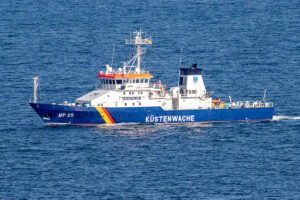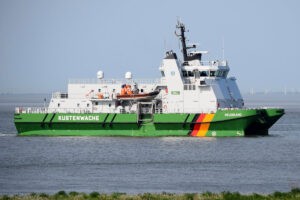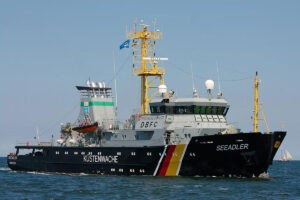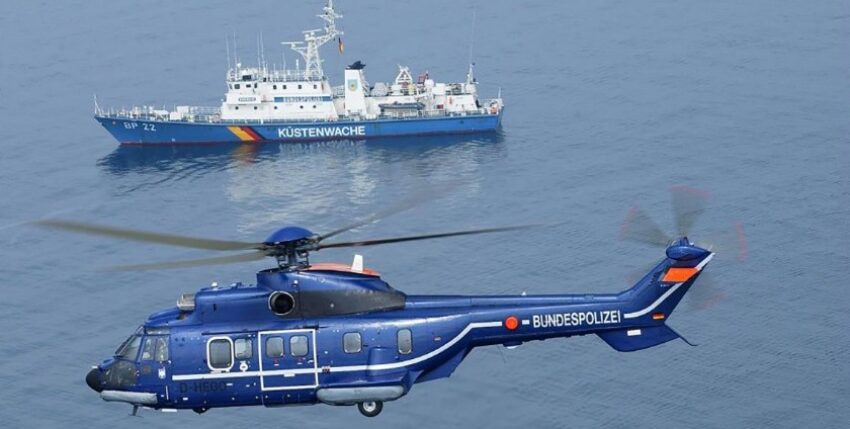So far, the call for a coastguard has gone unheard. The nucleus could be the Federal Maritime Police.
Maritime security is an essential part of an overall national security concept. This is why Germany has an extensive maritime network of federal and state authorities, agencies and organisations to ensure maritime security for German coastal waters, port approaches and harbours. While the federally structured USA has only one central institution, the US Coast Guard, for its 19,924 kilometres of maritime borders, five different federal ministries and five coastal states are responsible for maritime security in Germany, with a coastline of around 2,400 kilometres: the coastal states of Bremen, Hamburg, Lower Saxony, Mecklenburg-Western Pomerania and Schleswig-Holstein.
The Federal Ministry of Transport and Digital Infrastructure (BMVI) is responsible for the Waterways and Shipping Administration and the Maritime Police, the Federal Ministry of Finance (BMF) ensures compliance with customs regulations at sea, the Federal Ministry of Food and Agriculture (BMEL) is responsible for fisheries supervision and the Federal Ministry of Defence (BMVg) represents the German Navy. Finally, the Federal Ministry of the Interior (BMI) monitors Germany's maritime borders with the Federal Maritime Police. The basic responsibilities are regulated by a large number of laws.
Maritime Security Centre
The Maritime Safety Centre (MSZ) in Cuxhaven is the relevant competence centre for the operational forces of the federal government and the coastal states, bringing together all authorities and institutions responsible for maritime safety in this network. The MSZ includes the Federal Maritime Police, Customs, the Federal Agency for Agriculture and Food, the Federal Waterways and Shipping Administration, the waterway police of the five coastal states, the Central Command for Maritime Emergencies and the German Navy. The security authorities work together around the clock, 365 days a year, in the Joint Maritime Situation Centre, the operational core of the MSC, to ensure maritime security at sea.

At sea, customs prevents smuggling, controls the movement of goods and collects customs duties. Customs also supervises the EU's external borders at sea, monitors environmental protection and provides assistance in maritime emergencies. The operational area covers the German coastline, 15,055 square kilometres of coastal sea and the Exclusive Economic Zones (EEZ). Customs has 31 operational boats at its disposal, including two swath vessels. The Federal Agency for Agriculture and Food (BLE) monitors compliance with fishing regulations in the EEZ and within the coastal waters of Mecklenburg-Vorpommern. It owns three modern ocean-going fisheries protection vessels and three fisheries research vessels. The units are deployed worldwide. Germany has signed two international fisheries agreements in the North Atlantic and is therefore obliged to carry out monitoring trips lasting several months in the sea areas between Canada, Greenland and Norway. However, the most important and decisive contribution to maritime security is made by the Federal Maritime Police.
Federal Police Sea
The Federal Maritime Police is responsible for border police protection of German territory at the maritime borders of the North Sea and Baltic Sea. This includes preventing illegal entry across the 700 kilometre-long sea border, which is also an external Schengen border, and combating smuggling and trafficking in human beings at sea. The Federal Police Sea is also part of a kind of coastguard, a coordination network of federal law enforcement forces at sea, which includes customs, the Waterways and Shipping Administration and fisheries protection. It is also represented as a key security partner in the Joint Maritime Situation Centre of the Maritime Security Centre in Cuxhaven. Although it is not a coastguard, it nevertheless plays a key role in Germany's maritime security as a kind of coastguard.
The wide-ranging tasks of the Federal Maritime Police include the surveillance and control of cross-border traffic at the external maritime borders as well as police investigations into criminal offences with a border police and maritime background, the surveillance of sea areas and shipping traffic on the North Sea and Baltic Sea through maritime patrols and surveillance flights with helicopters to ensure compliance with shipping police regulations and to prevent water pollution as well as investigations into environmental offences outside the territorial sea. For the maritime patrol service, the subordinate federal police directorates of Neustadt, Warnemünde and Cuxhaven have six patrol vessels and six control and patrol boats at their disposal for coastal surveillance. In addition, navalised H 225 Super Puma helicopters from the Federal Police are used for daily surveillance of the sea areas. With the three new operational vessels BP 81 POTSDAM, BP 82 BAMBERG and BP 83 BAD DÜBEN, which have been in service since 2019, the Federal Police Sea has become capable of operating on the high seas.
The 86.20 metre long and 13.40 metre wide multi-purpose vessels with a gross tonnage of 1980 reach a speed of 21 knots. In terms of displacement and size, they are similar to the German Navy's Class 130 corvettes and are among the largest police vessels in the world. They have bays for mission containers and a helicopter deck as well as a small hangar for the possible operation of reconnaissance drones. On board, 48 people can be accommodated. These mainly include special forces such as the GSG 9 of the German Federal Police. Since 2020, the armament has included a 57-millimetre Bofors Mk 3 gun. Ships and helicopters are deployed and controlled from the federal control centre in the Cuxhaven Maritime Security Centre. With these ships, the Federal Maritime Police have the prerequisites for a coastguard with deep-sea capabilities, as traditionally exists in many nations. This could be a step towards a national coastguard.
In addition to monitoring and controlling the coastal waters of the North Sea and Baltic Sea, the range of tasks of the new operational vessels also includes environmental protection, counter-terrorism at sea, combating smugglers and human traffickers, migration control, protection of offshore facilities and maritime infrastructure as well as EU missions within the framework of the European border protection agency Frontex. Other assigned tasks include fisheries monitoring and the monitoring of underwater work in marine mining and research activities in the area of the German continental shelf at sea, as well as assistance at sea and marine accident investigations by officers of the Maritime Investigation and Search Group in the event of incidents outside the territorial sea on ships flying the German flag.
Frontex in the Aegean
Since March 2016, the German Federal Maritime Police has been participating in the Frontex Poseidon Sea operation in the Aegean Sea with the BP 62 UCKERMARK and BP 64 BÖRDE patrol boats. Specifically, the Frontex operation involves supporting the Greek coastguard in securing the EU's maritime borders in the Aegean and monitoring the Greek-Turkish sea border. The two German patrol boats and around 30 federal police officers are stationed on the Greek island of Samos and operate from there together with the Greek coastguard. In addition to the Greek and German patrol boats, coastguard boats from the EU member states Sweden and Finland are also deployed in the Aegean Sea. The two control and patrol boats were loaded onto a cargo ship in Rostock in 2016 and transported to Samos using the piggyback method. This transfer procedure will no longer be necessary for the three new operational vessels, as these seaworthy ships can reach distant operational areas on their own keel.

Piracy prevention centre
Preventing and combating piracy is also one of the tasks of BPOL See. The Piracy Prevention Centre (PPZ) was set up in Neustadt in Holstein in 2010. The PPZ offers the maritime industry an information platform on piracy prevention. This enables users to exchange up-to-date information between shipping companies, authorities and maritime organisations on dangerous shipping routes and thus to quickly and purposefully manage current situational awareness with the aim of providing options for action to protect against piracy and prevent ship hijackings.
The services of the PPZ include current risk assessments, recommendations for technical preventive measures, measures to protect the crew, communication of principles of behaviour such as passive defence (water hoses, railing protection, citadel) or practical defence (nautical manoeuvres), implementation of hazard plans and best management practices, team training or psychological preparation. In the event of an acute pirate attack, the PPZ is available to shipowners in the Maritime Standby Service with maritime expertise.

Cooperation with the navy
There has always been close and trusting cooperation between the German Federal Maritime Police and the German Navy, as both are responsible for the protection and security of German territory at sea. Since 2011, the German Navy has also been represented in the Maritime Security Centre and the Joint Maritime Situation Centre together with the Federal Maritime Police. Apart from their role in the event of tension and defence, and unlike many other navies in the world, the German naval forces have no police enforcement powers within German territorial waters and in the Exclusive Economic Zone. However, on the basis of administrative agreements, the German Navy supports the federal and state law enforcement authorities in the areas of maritime surveillance, search and rescue (SAR) at sea, transport, oil monitoring and oil spill response. In Neustadt and Warnemünde, the Federal Maritime Police are located within the Navy's properties. The maritime units of the Navy and the Federal Police Sea also regularly support each other logistically, technically and in terms of personnel as required - especially during joint exercises and in training and further education. Finally, the German units on the EU-led anti-piracy mission Atalanta have also embarked law enforcement officers from the Federal Police in addition to military police officers.
A national coastguard is called for
When the timber freighter PALLAS drifted burning in the sea in 1998 and finally ran aground off Amrum, an environmental disaster occurred in the Schleswig-Holstein Wadden Sea National Park. Several attempts to tow the ship failed due to the storm. The investigations by the Maritime Authority into the PALLAS accident revealed numerous problems with accident prevention, accident control and accident management due to a confusion of competences, unclear responsibilities and a lack of coordination. The final report of the Kiel state parliament in January 2000 called for the formation of a unified coastguard on the basis of the PALLAS experience. However, instead of a coastguard, the Maritime Safety Centre was set up in Cuxhaven in 2004 to implement the German Coastal Safety Concept drawn up by the federal government and the coastal states after the accident. The concept includes radar and aerial surveillance of the sea area, pilotage, the deployment of emergency tugs for unmanoeuvrable ships, environmental protection at sea and the coordination of rescue operations.
However, coordination organisations such as the Central Command for Maritime Emergencies and the MSC do not yet constitute a unified coastguard. On the one hand, the tasks of the Central Command for Maritime Emergencies and the MSC are almost identical; on the other hand, the MSC is based on an administrative agreement that preserves federal autonomy and retains the original responsibilities of the participating authorities and federal states. As a result, the MSC continues to rely on the lending of organs, administrative assistance and other auxiliary legal constructions for all of its decisions and measures. The original responsibilities of the authorities and federal states remain unchanged.
The calls for a unified coastguard go back a long way. As early as 1954, after the Federal Border Guard was founded in 1951, the Federal Court of Auditors called for the merging of the federal sea-going forces. However, the coastal states and federal ministries refused. In 2005, Schleswig-Holstein wanted to place its coastguard, which was formed from several state authorities, under the control of the federal government. This failed due to the veto of the other coastal states. An initiative by the FDP parliamentary group argued in favour of creating a national coastguard in two stages. Firstly, the federal responsibilities should be summarised and then the state responsibilities transferred to the federal government. This demand was also rejected.
The Schutzgemeinschaft Deutsche Nordseeküste and the Nordfriesische Insel- und Halligkonferenz have repeatedly called for a tightly organised coastguard under uniform command. The BMI drew up a proposal for this in 2010: Integrating the Water Customs Service into the Federal Maritime Police and merging the control centres of the Federal Police, Customs Administration and Fisheries Inspectorate. This would have meant an improvement in safety at sea through the standardised performance of tasks throughout Germany as well as cost benefits through joint management. This proposal also remained on paper.
A motion submitted by the governing parties on 11 May 2011 on the future viability of the maritime industry as a national task states: "Sticking to federal structures in the area of transport safety and security on the seas, maritime waterways and seaports is not expedient. The establishment of the National Central Command for Maritime Emergencies, the Coastguard Coordination Network and the Maritime Security Centre are the first steps towards improving maritime safety and security. However, the system remains vulnerable in the event of conflicts." The Bundestag should therefore call on the Federal Government to "as a first step, bring together the competences of the federal authorities operating at sea with the subsequent aim of establishing a national coastguard." Ultimately, a national coastguard in the form of an independent authority was called for. Due to its material and personnel resources and expertise, leadership could lie with the Federal Maritime Police. The area of responsibility should encompass German territorial waters and all obligations incumbent on the Federal Republic of Germany on the high seas. So far, however, all calls for a coastguard have been shelved.
Dieter Stockfisch









One Response
In 2022 and in the age of the turnaround, today's statements by the Minister of Defence at a BAKS event should be applied to the long-standing call for a joint coastguard:
No more pretty papers, realise them instead.
Away with federal steeples for the benefit of all!